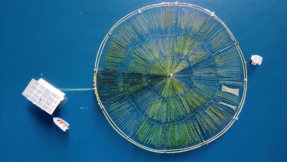Mitigating Climate Change through Innovative Technology in Southeast Asia
Thanks to The Don & Joan Stanley Family Fund at the Edmonton Community Foundation, Myriad Canada supports innovation to boost climate resilience and livelihoods.
On the island of Bohol in the Philippines, a once thriving seaweed cultivation industry is on the verge of collapse. Bohol is one of thousands of tropical coastal communities across Southeast Asia that have seen the devastating impact of climate change on their way of life. With the support of Canadian donors, Myriad Canada is helping the non-profit Climate Foundation develop innovative marine permaculture technology, promising great benefits to local economies as well as the environment.
“Myriad Canada, in partnership with the Climate Foundation, can enable these value chains across the world, starting in Southeast Asia, in areas where they are needed in so many ways,” says founder and executive director of the Climate Foundation, Dr. Brian Von Herzen.
New Technology to Mitigate Climate Destruction
Seaweed farmers in Southeast Asia are on the frontlines of climate disruption. The warming climate has raised ocean temperatures, reducing nutrients near the surface and promoting plant diseases. Warmer waters also give momentum to major tropical storms, or typhoons, which decimate seaweed production and rob already vulnerable communities of their livelihoods.
The Climate Foundation, who won the 2022 XPRIZE for Carbon Removal Milestone Award, is developing deepwater irrigation technology designed to mitigate the effects of climate change and improve local economic sustainability. It has designed a structure for growing seaweed that can be lowered at night to access nutrient-rich colder water and raised during the day to access sunlight, and which also protects seaweed farms from destructive storms. This system greatly regenerates historic production, while promoting carbon capture and biodiversity.

Sustainable Cultivation for People and Planet
Seaweed mariculture has traditionally been an artisanal industry producing mainly dried seaweed. To enhance local value chains, the Climate Foundation is developing a transportable seaweed biorefinery to extract a liquid containing valuable biostimulants from the seaweed before it is dried. This product can be sold as an organic fertilizer to local rice farmers, while the remaining dry pulp can also be processed for multiple uses.
“The deepwater irrigation enables the seaweed communities to go from collapsing to surviving,” says Dr. Von Herzen. “But the biorefinery enables those communities to go from surviving to thriving because they’re getting more of the revenue of every seaweed dollar they produce.”
Not only is the seaweed biostimulant highly effective at boosting rice yields, it also reduces the use of harmful conventional fertilizers and chemical run-off as well as greenhouse gas emissions.
Local Solutions, Global Impact
With the support of Myriad Canada, the Climate Foundation successfully tested its seaweed biorefinery prototype on Bohol in late 2023. Farmers have been very receptive to adopting the new solutions, which can be operated on a community level. “We are one of the few international projects that have actually developed right in the Global South for communities in Southeast Asia,” says engineering consultant Theresa Theuretzbacher. “We’ve really tried to develop it for the people there to use it.”
Once the technology is perfected, it can be scaled up to enhance food security and sustainability across Southeast Asia and beyond, according to Dr. Von Herzen: “By choosing to build decentralized tech, we think it will have a strong positive benefit for the livelihoods of coastal communities operating the biorefineries, and the rice farmers that are responsible for much of the food security across Southeast Asia and ultimately globally.”

